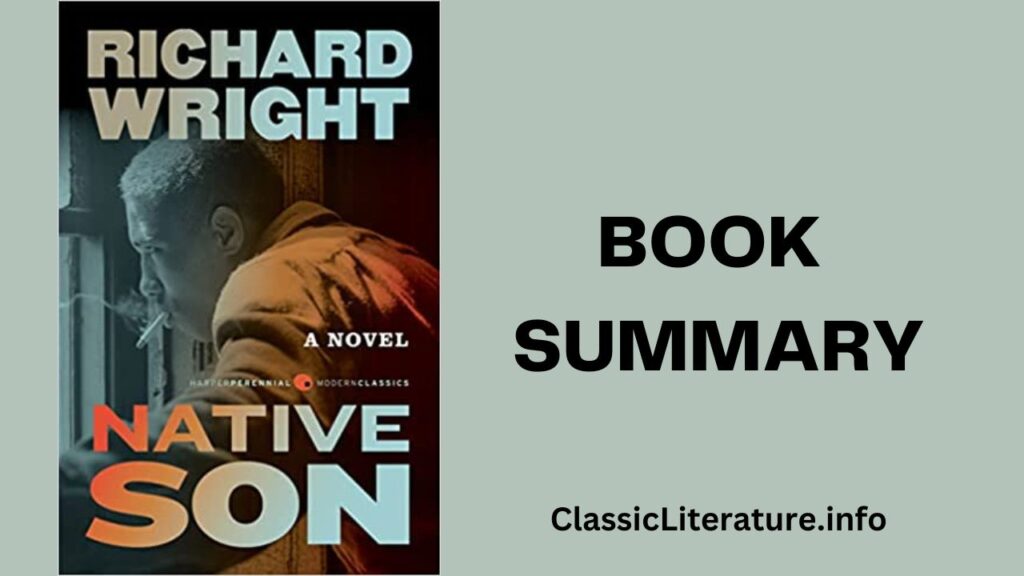
“Native Son” by Richard Wright is a groundbreaking novel that explores the systemic racism and oppression faced by African Americans in 1930s America. The story follows the life of Bigger Thomas, a young black man living in poverty in Chicago’s South Side. Bigger’s life takes a tragic turn when he accidentally kills a white woman, Mary Dalton, while working as a chauffeur for her family.
As the narrative unfolds, Wright delves into Bigger’s psyche, exploring the social and psychological factors that contribute to his actions. Bigger becomes trapped in a web of fear, guilt, and racial tension as he tries to evade capture by the authorities. The novel examines the impact of societal pressures, poverty, and institutionalized racism on the lives of black individuals, shedding light on the complex dynamics of power and prejudice.
Wright’s writing style is raw and visceral, immersing readers in Bigger’s perspective and experiences. The prose is marked by vivid descriptions, intense emotions, and a powerful sense of urgency. Wright’s use of gritty realism and his unflinching portrayal of racial inequality make “Native Son” a compelling and thought-provoking read.
Here are some notable quotes from “Native Son”:
- “The walls of the world closed in on him, suffocating him. He was now awake, and wished he were asleep. But he was unable to leave the reality of his situation; he was committed to this grim, chilling existence, to the need that was laid upon him.”
- “He was afraid of the white man. He felt the hate of his color, and he hated that hate. He could not live, he knew, in their world, without submitting to the will of the white man.”
- “They don’t let us live in America, and they don’t let us die here either.”
Get Paperback or Kindle version of the book <–
“Native Son” is a must-read for its exploration of racial injustice, its examination of the human condition under oppressive circumstances, and its unflinching critique of systemic racism. It challenges readers to confront uncomfortable truths and raises important questions about identity, power, and the consequences of societal marginalization.
Reader Reviews:
- “Richard Wright’s ‘Native Son’ is a powerful and gripping novel that offers a searing portrayal of racism and its devastating effects on the lives of black individuals. The book is an emotional rollercoaster, forcing readers to confront uncomfortable truths and examine their own biases. It is a must-read for anyone interested in understanding the complexities of racial inequality and its profound impact on society.”
- “Wright’s writing is compelling and evocative, drawing readers into Bigger’s world and making them feel the weight of his experiences. The novel challenges the reader’s perspective and forces them to question their own assumptions and prejudices. It’s a book that stays with you long after you’ve finished reading it.”
- “While ‘Native Son’ is undeniably a powerful and important work, some readers may find the graphic depiction of violence and racial hatred unsettling. The novel can be emotionally draining, and it does not shy away from the harsh realities of racism. However, it is precisely this unflinching honesty that makes the book a necessary read for those seeking to deepen their understanding of racial oppression.”
In conclusion, “Native Son” is a seminal novel that tackles the issues of racism, poverty, and social injustice with unyielding honesty. It is a thought-provoking and emotionally charged book that challenges readers to confront the uncomfortable realities of systemic racism. “Native Son” is recommended for those who are interested in exploring the complexities of race relations, social inequality, and the human condition in the face of adversity.
About the author
Richard Wright (1908-1960) was an influential African American writer and activist. Born in Mississippi, Wright experienced firsthand the racial prejudice and discrimination that he would later write about in his works. He became one of the leading voices of the African American literary movement, using his writing to expose the injustices faced by black people in America. Wright’s contributions to literature and his commitment to social justice continue to resonate, making him a pivotal figure in American literary history.





